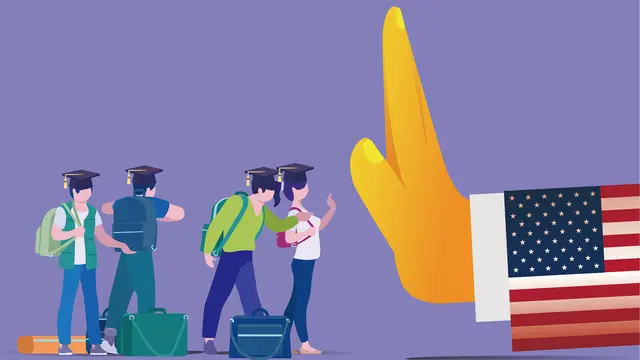
/VCG
Editor's note: Haider Rifaat is a features writer for OK! Pakistan, the international edition of OK! Magazine. He is also a writer for Arabian Moda and Flanelle magazine and serves as the creator and host of Pakistan's first web talk show – The Haider Rifaat Show. The article reflects the author's opinions, and not necessarily the views of CGTN.
It is evident that former U.S. President Donald Trump's reign primarily affected the education system in America. Part of it had to do with Trump's racism manifested in the form of immigration policies that limited access of international students to enter the United States to pursue higher education.
Immigration policies affect people who wish to escape war zones and fly out to America for a better life. It also hinders cultural exchange that aims to bolster international relations. We are already familiar with Trump's racism when he referred to El Salvador, parts of Africa and Haiti as "shithole countries."
He also spearheaded a travel ban, barring citizens from seven Muslim-majority countries from entering the United States. The lattermost ban made many incoming Muslim students wary about their future studies in the U.S. Luckily, the ban was temporary. Imagine the repercussions that would have followed had the ban lasted longer.
In May 2020, Trump issued Proclamation 10043, barring Chinese students from receiving J-1 and F-1 student visas. The proclamation resulted in the United States denying more than 1,000 Chinese students their U.S. visas last year. The proclamation continues under the Biden administration on the pretext of it being a "costly policy" to the United States. It is easier to sugarcoat a racist proclamation that targets a particular country – America's longtime rival, China.
The original proclamation passed by Trump has an agenda of its own. The policy states, in part, "The People's Republic of China (PRC) is engaged in a wide-ranging and heavily resourced campaign to acquire sensitive United States technologies and intellectual property, in part to bolster the modernization and capability of its military, the People's Liberation Army (PLA). The PRC's acquisition of sensitive United States technologies and intellectual property to modernize its military is a threat to our Nation's long-term economic vitality and the safety and security of the American people."

/VCG
The statement alone slanders China without presenting evidence of any sort. Trump's mission was to lobby against China with this proclamation. It aims to "punish" Chinese institutions, not necessarily the citizens, according to a U.S. university representative.
Biden followed Trump's footsteps and kept in place this radical, prejudiced policy targeting Chinese graduate students. This unexpected move further paints China as the "bad guy" mainly for political reasons.
Denying Chinese students visas on the basis of their prior enrollment in Chinese universities is unfair, and frankly, quite absurd. It proves that Chinese universities are in fact, producing outstanding talents and Trump, now Biden, fear that exceptional, bright students from China would likely surpass an average American in all academic areas.
The proclamation holds no merit and lays bare insecurities stemming from the White House. This is not the first time the U.S. lodged a slanderous campaign against China. BBC News reported last year that the United States cautioned that not all students from China were "normal" and that some were agents sent by the Chinese government. These remarks not only come across as xenophobic but are also extremely dehumanizing.
The U.S. and China are already on the fence with each other, and the emergence of the 10043 discriminatory policy is adding to the problem.
Since the onset of the pandemic, U.S.-China relations have regressed. It is against the backdrop of anti-Asian sentiments, hate crimes in America and proclamations like 10043 that have largely discouraged the Asian-American community from living in the United States.
(If you want to contribute and have specific expertise, please contact us at [email protected].)
 简体中文
简体中文



